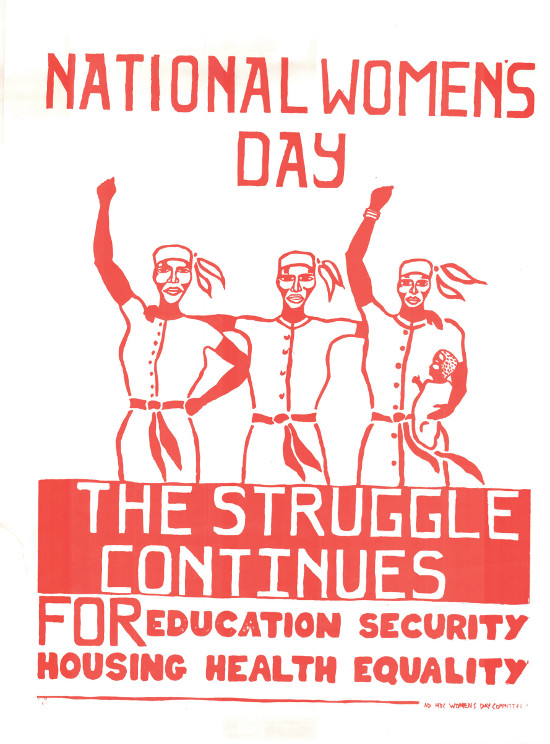"If the moon were to shine tonight
To light up my face and show off my proud form
With beads around my neck and shells in my hair
And a soft easy flowing dress with the colours of Africa
If I were to stand on top of a hill
And raise my voice in praise
Of the women of my country
Who have worked throughout their lives
Not for themselves, but for the very life of all Africans
Who would I sing my praises to?
I could quote all the names
Yes, but where do I begin?!
Do I begin with the ones
Who gave their lives
So that we others may live a better life
The Lilian Ngoyis, the Victoria Mxenges
The Ruth Firsts
Or the ones who have lost their men
To Robben Island and their children to exile
But carried on fighting
The MaMotsoaledis, the MaSisulus
The Winnie Mandelas?Or maybe I would sing praises to
The ones who, have had the resilience
And cunning of a desert cobra
Priscilla Jana, Fatima Meer, Beauty Mkhize
Or the ones who turned deserts into green vegetable gardens
From which our people can eat
Mamphela Ramphele, Ellen Kuzwayo
Or would the names of the women
Who marched, suffered solitary confinement
and house arrests
Helen Joseph, Amina Cachalia, Sonya Bunting, Dorothy Nyembe,
Thoko Mngoma, Florence Matomela, Bertha Mkhize,
How many more names come to mind
As I remember the Defiance Campaign
The fights against Beer Halls that suck the strength of our men
Building of alternative schools away from Bantu Education
And the fight against pass laws
Maybe, maybe, I would choose a name
Just one special name that spells out light
That of Mama Nokukhanya Luthuli
Maybe if I were to call out her name
From the top of the hill
While the moon is shining bright;
No-Ku-Kha-nya!
NO-KU-KHA-NYA!Maybe my voice would be carried by the wind
To reach all the other women
Whose names are not often mentioned
The ones who sell oranges and potatoes
So their children can eat and learn
The ones who scrub floors and polish executive desktops
In towering office blocks
While the city sleeps
The ones who work in overcrowded hospitals
Saving lives, cleaning bullet wounds and delivering new babies
And the ones who have given up
Their places of comfort and the protection of their skin colour
Marian Sparg, Sheena Duncan,
Barbara Hogan, Jenny Schreiner.
And what of the women who are stranded in the homelands
With a baby in the belly and a baby on the back
While their men are sweating in the bowels of the earth?
May the lives of all these women
Be celebrated and made to shine
When I cry out Mama Nokukhanya's name
NO-KU-KHA-NYA! !
And we who are young, salute our mothers Who have given us
The heritage of their Queendom!!!"
The 9th of August has since been declared National Women's Day, a public holiday in South Africa, in honour of the women who marched against the pass laws on that day in 1956, as the struggle they fought was for the greater good of all South Africans. The month of August has also come to be known as the ‘Women's Month'.
The Women's Month in South Africa is a way of acknowledging the critical role played by women in the struggle and to thank them for the sacrifices they made, the strength and determination they showed, and the special contribution that women made towards overthrowing the apartheid regime.
Every year on the 9th August - Women's Day - it is important to take time to think about the role of women in the struggle and recognise their courage and perseverance. It also gives South Africans the space to reflect on the on-going struggles that women face today.
Exhibitions in the classroom
Reading the past
SOURCE: Praise poem by Gcina Mhlophe.
Although the praise poem was written to honour Nokukhanya Luthuli, Gcina Mhlope honours all women in the struggle. She recognises the icons of struggle and the sacrifices they made and the suffereing they endured. But she also recognises the ordinary women who struggled to bring food home for their children, who worked and toiled to survive in a society that discriminated against them as black women workers. By ending the exhibition with this poem, it brings together the two forms of struggle that we identified at the beginning of the exhibition.
Read the poem above and answer the questions.
1. Find evidence in the poem that show some of the sacrifices that women made during the struggle against apartheid.
2. Find evidence in the poem that show some of the struggles that ordinary women faced and still face today.
3. Find three words or phrases from the poem that meant something to you. Explain why these words or phrases are important to you.




